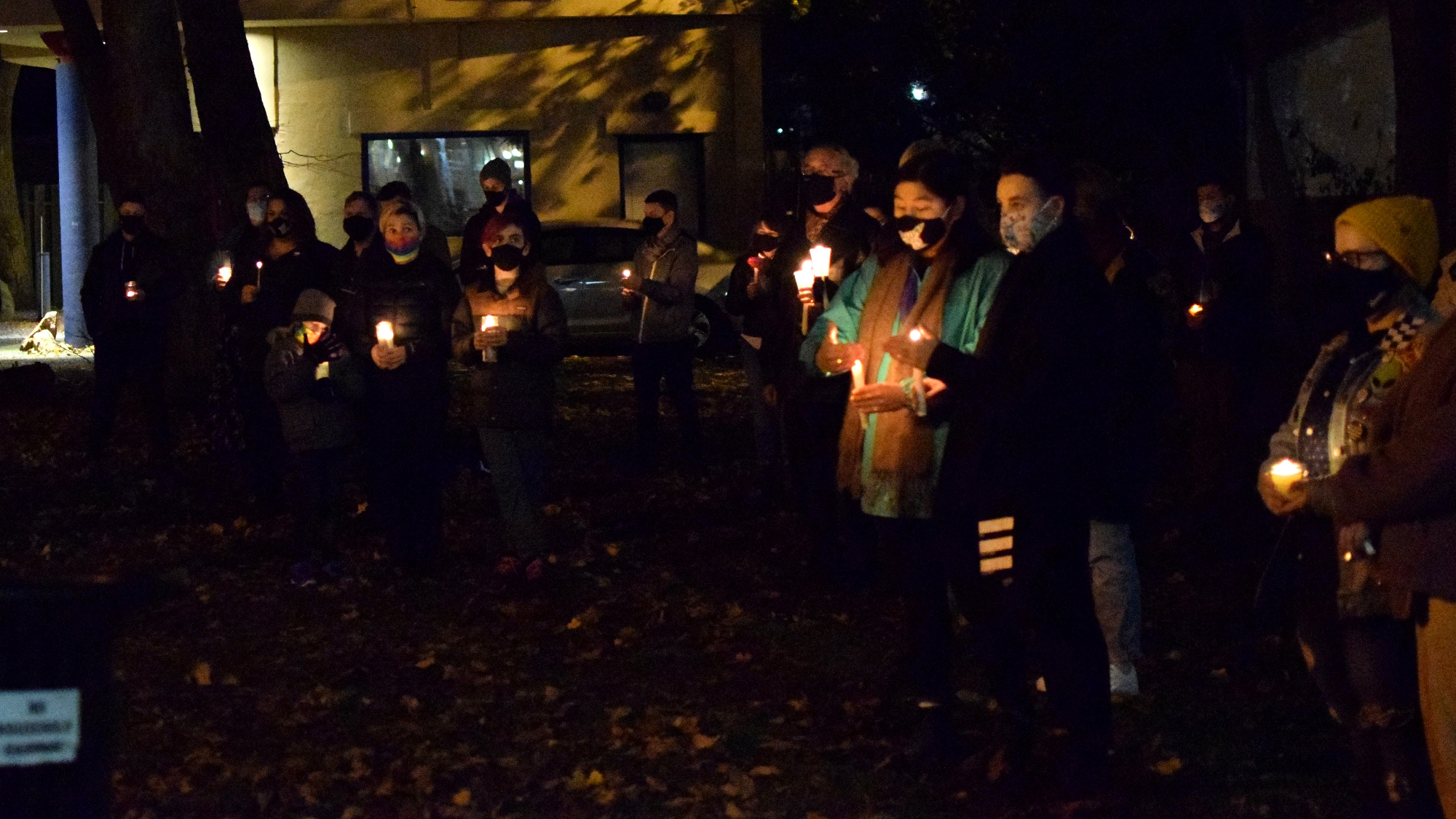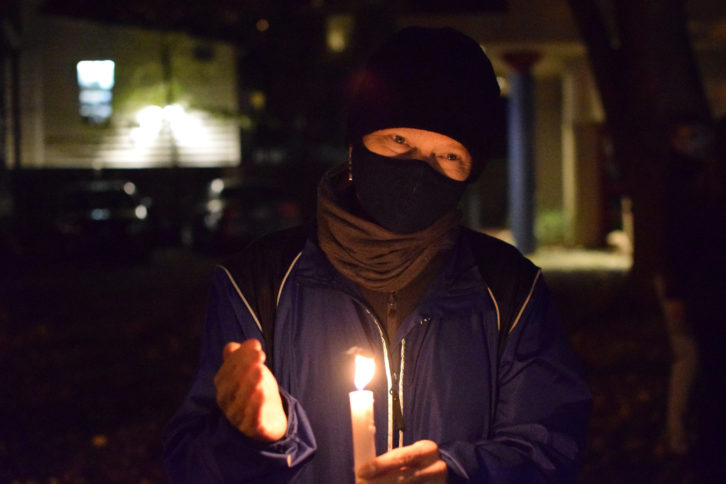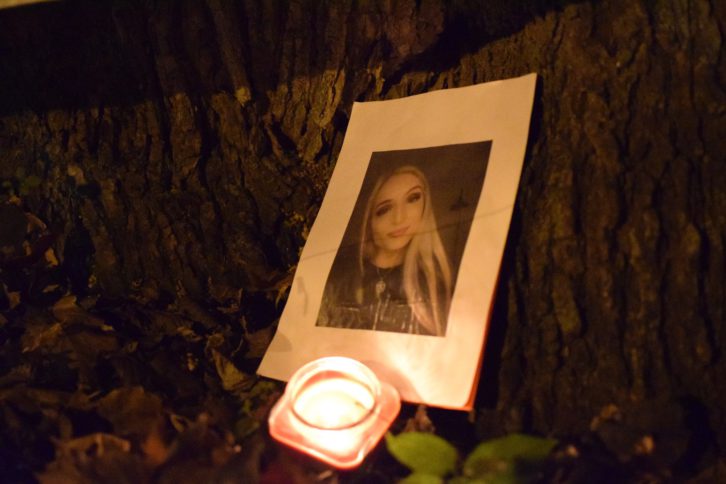Solemn vigil marks another year of transgender lives lost
Nov. 20 is the annual Transgender Day of Remembrance

caption
People gather at Raymond Taavel Park in Halifax to honour transgender lives lost because of transphobia.Charlie Johnson hopes one day being transgender won’t come with the threat of violence. But Friday marked another year of transgender people being murdered for just being themselves.
“Today is a day of remembrance, and the people we are remembering are those transgender lives lost to violence and transphobia,” Johnson said, as about 50 people gathered near in Raymond Taavel Park.
“We are taking the time as a community to remember that we are still fighting the battle of egality and equality.”
Transgender Day of Remembrance is held every year on Nov. 20 across the world to honour the lives lost because of transphobia and anti-transgender violence. It began in 1999 when transgender advocate Gwendolyn Ann Smith held a vigil for Rita Hester, a Black transgender woman, and all transgender people killed in acts of violent transphobia since her murder a year earlier. Related stories

caption
Nova Scotia Rainbow Action Project co-chair Susanne Litke says Transgender Day of Remembrance is important for marking the loss of the many people transphobic violence kills every year.The Nova Scotia Rainbow Action Project advocates for equity, justice, and human rights for 2SLGBTQIA+ people in Nova Scotia. It organized this year’s candlelight vigil in Halifax.
“The numbers are just so horrific if you start looking at the statistics,” NSRAP co-chair Susanne Litke said in an interview. “So it’s important to make sure that we recognize that transphobia, binarism, homophobia — those ills in our society still exist.”
At least 350 transgender and gender-diverse people around the world were murdered between Oct. 1, 2019, and Sept. 30, 2020, according to Transrespect versus Transphobia Worldwide. Since TvT began its research in 2008 it has recorded 3,664 murders globally. TvT notes that because some murders go unreported or are harder to identify as the murder of someone who is transgender or gender-diverse, the number is likely higher.
Living with fear
Chris Cochrane told those gathered at the vigil that it had only been a day since someone last verbally harassed her.
“As a Black trans woman, I know how hard it is to be living in this world today. As of yesterday, I was called everything to the lowest, but I still persevere and I still move on,” Cochrane said.
Cochrane said she can testify that there is still bigotry in Nova Scotia.
“The problem within our community is polite ignorance. They like to say that we don’t have racism, that we don’t have transphobia or homophobia here in Nova Scotia,” Cochrane said. “I am definitely one of those people that’s here to say that is wrong.”
One way this bigotry shows is how people will justify the murders of trans women by “saying they were prostitutes, so therefore, they deserve it,” Cochrane said. “Nobody deserves for their life to be shortened. Nobody deserves to be hated. Nobody deserves to be taken away from their families.”
In his speech, Charlie Johnson spoke about the threat of violence he faces as someone who is openly transgender. When Johnson started advertising his business, Queer Realty, someone reached out and warned him about another transgender realtor who was targeted.
“They told me a story about a realtor they knew who was beaten during a house showing because someone made a fake name and set up a fake viewing to harm them,” Johnson said. “In my life, this is a genuine nightmare.”
Johnson said he’s thankful for the support from the 2SLGBTQIA+ community. He was pleased to see so many people show up for the vigil.
“I just want to say thank you so much for everybody who came out tonight, because the only way that we’re going to move forward and make progress in our society, and our communities and in the lives of people around us are by showing up,” Johnson said.

caption
Timothy Lundrigan brought a photo of Rukia Isis Bemer to the vigil. Bemer was a transgender woman living in Ohio. At 22, she took her own life in August 2020.Remembering Rukia Isis Bemer
Timothy Lundrigan attended the vigil to remember friends lost and to show support for the transgender community. Lundrigan is gender-fluid and uses he/him and they/them pronouns. They said they recognize how much transgender people contributed to the fight for civil liberties.
“A lot of the institutions, services and civil liberties that we take for granted here in this country on a daily basis, we would not have them if not for the blood, the sweat, the tears, the movement and the energy of the transgender community, particularly the BIPOC transgender community,” Lundrigan said.
Lundrigan brought a photo of Rukia Isis Bemer to the vigil. Bemer, 22, was a transgender woman living in Ohio. In August, she took her own life. Lundrigan wanted to make sure people remembered her.
“Rukia Isis Bemer. I want everybody to hear that name. Let it resonate in your heart for a moment,” Lundrigan said to those gathered for the vigil. “She was a human being. She had family. She had people who cared and loved for her.”
In an interview, Lundrigan said they also spoke about Bemer because her story shows that “the suffering, the exclusion, and the erasure that transgender people face on a daily basis” can lead even someone as strong as Bemer to suicide.
Research from the Centre for Suicide Prevention states that 22 to 43 per cent of transgender people have attempted suicide and are two times more likely to attempt suicide than lesbian, gay or bisexual people. These numbers are in part because transgender people face more discrimination and harassment than cisgender people, according to the centre.
Safety is still a worry
After seeing how many people showed up to the vigil, NSRAP co-chair Nat Boyd had mixed feelings.
“I’m inspired, but at the same time, I’m feeling quite sad,” Boyd said.
“I’m here with my two children, and one of them turned to me and said, ‘Mama, I’m so scared every time we go to one of these events, I feel like we’re gonna get shot.’
“So trying to then encourage them to come into this circle and balancing their need for safety and my need to organize and be an activist was personally quite a challenging decision I had to make in a split second.”
Susanne Litke said even in spaces devoted to the 2SLBGTQIA+ community, they are still reminded of past violence, like the 2016 massacre at the Pulse nightclub in Orlando, Florida, where 49 people were killed.
“We need to recognize that as well, that this is not yet a safe world for us.”
